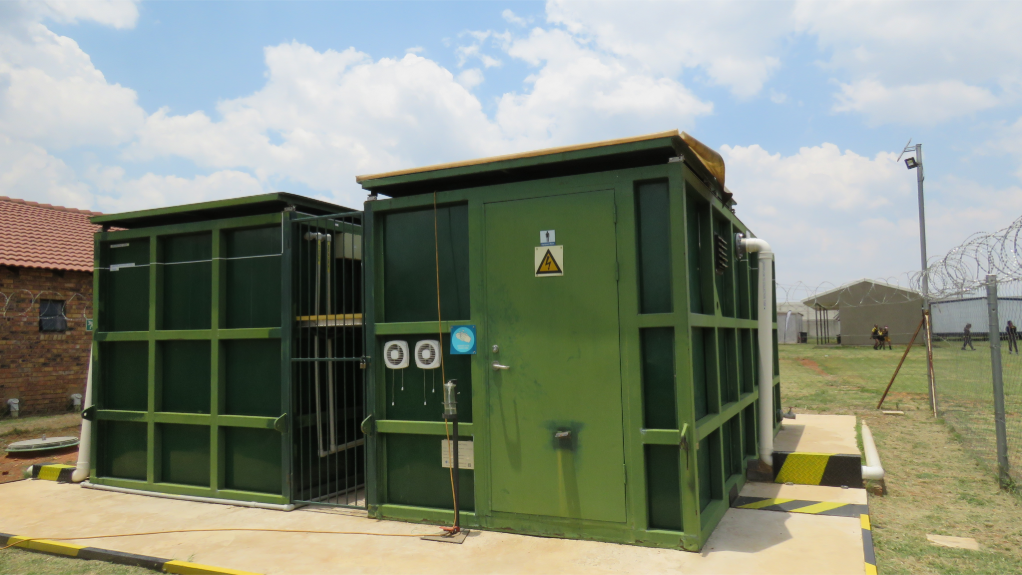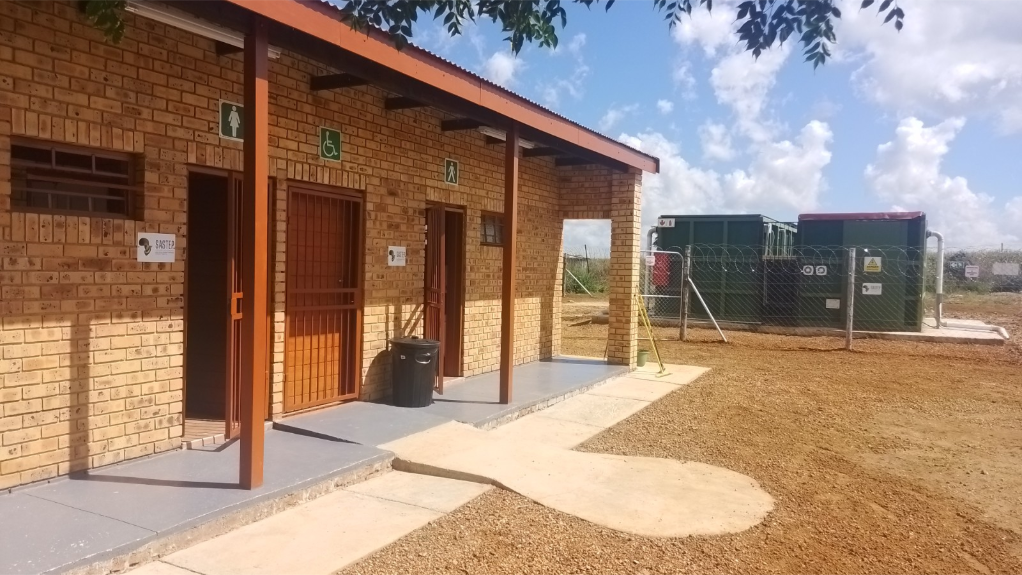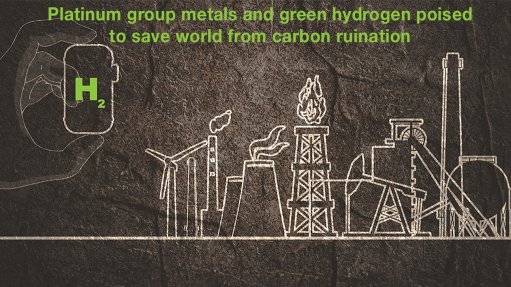Sanitation solution developed for underserved communities, schools



NON-SEWERED SANITATION SYSTEM The self-sustaining, flushing toilet system that recycles 100% of used water targets underserved communities, and is environmentally sustainable and practical for widespread implementation
INCREASED ATTENDANCE Since its introduction at Tsholetsega School, there has been an 80% reduction in student absenteeism
The introduction of the Enviro Loo Clear Non-Sewered Sanitation System (NSSS) marks a substantial advance in addressing pressing issues of sanitation and water scarcity, says sanitation service provider Enviro Loo COO Mark La Trobe.
The self-sustaining, flushing toilet system that recycles 100% of used water targets underserved communities, and is environmentally sustainable and practical for widespread implementation.
Developed through collaborative efforts under the South African Technology Enterprise Programme (SASTEP) and the Water Research Commission, the Enviro Loo Clear NSSS has been installed in 14 schools and one informal settlement to date.
The self-contained, off-the-grid toilet system achieves 100% recycling within a closed circuit using a natural biological process to treat wastewater and eradicate pathogens.
It operates independently of sewer infrastructure, continuous water supply or mains electricity, owing to the integration of a solar-powered option as its power source.
Leveraging this biological method of purifying wastewater and destroying pathogens eliminates reliance on conventional sewer connections, constant water, or electrical grid access.
“Adaptability and efficiency are at the core of the Enviro Loo Clear system’s design,” La Trobe adds, noting that the system’s back-end treatment plant is designed to interface seamlessly with various front-ends, such as ablution blocks and community facilities, catering to up to 40 flushing toilets.
He notes the process of handling wastewater involves, initially, wastewater flowing into a sequence of automated tanks where organic contaminants are broken down biologically.
This step is followed by treatment in a membrane biological reactor, which further purifies the water, after which it is disinfected using ozonation, making it clean and suitable for recycling.
The system was subjected to a three-year evaluation period at two schools and an informal community.
Following the pilot projects, locally produced Enviro Loo Clear systems have been implemented at two additional schools in KwaZulu-Natal, one in Mpumalanga, and nine in the Eastern Cape.
The Department of Education, along with other significant stakeholders, plans to expand this innovative system to 30 more locations nationwide within the next six months, La Trobe says.
He adds that each Enviro Loo Clear NSSS has the potential to conserve up to 180 000 ℓ/m of water.
Since its introduction at Tsholetsega School in Kagiso, in Gauteng, the school’s principal has noted a significant reduction in student absenteeism, which translates to a yearly decrease in missed school days from 26 000 to 5 200.
The examination of the relationship between absenteeism and inadequate sanitation reveals that schools situated in areas using substandard toilets, such as pit latrines, experience higher rates of illness attributable to poor sanitation, which correlates with increased absenteeism, La Trobe explains.
He notes that the enhancement of sanitation facilities therefore not only fosters awareness of hygiene practices but also ensures safe and dignified access for both educators and learners, contributing to a decline in absenteeism.
Further, he adds that studies indicate that the absence of secure and private facilities for sanitary product disposal disproportionately affects girls, particularly during puberty, leading to increased school absences.
“The implementation of upgraded ablution facilities equipped with the Enviro Loo Clear system mitigates this issue by providing privacy and effective disposal solutions, thereby reducing absenteeism,” La Trobe tells Engineering News.
He further underscores the importance of community engagement in the project’s success, noting that Enviro Loo’s strategy actively involves local communities and authorities in its projects, ensuring stakeholder engagement beyond mere information sharing.
Further, this approach addresses installation challenges in remote locations by using local contractors and suppliers, thereby extending the system’s reach and impact, he explains.
The initiative not only meets immediate sanitation needs but also promotes local economic growth by creating jobs and supporting small businesses, aligning with Enviro Loo’s commitment to community development.
Through understanding the unique needs of each community, Enviro Loo then employs a social facilitation team led by a client liaison officer to engage stakeholders, gain project approval, and foster community acceptance.
“The involvement of local residents in the project, particularly through employment, instils a sense of ownership and pride, which is crucial for the project’s success.”
La Trobe further emphasises the importance of regular system maintenance, for which local technicians are employed. This, in turn, has led to the surpassing of the company and communities’ expectations of health, economic and environmental benefits.
The Enviro Loo Clear NSSS is notable for its contributions to sanitation and its positive impact on the environment, La Trobe adds, highlighting its environment-friendly design. This aligns with the company’s broader efforts to reduce resource consumption and carbon emissions, evidenced by the integration of solar power options.
La Trobe is optimistic about the potential for scaling the technology locally and in other African countries.
Addressing the backlog in the replacement of unsafe sanitation facilities in schools remains a priority, he notes, adding that there is a broader aim of fostering a model that can be replicated in similar contexts globally.
Comments
Press Office
Announcements
What's On
Subscribe to improve your user experience...
Option 1 (equivalent of R125 a month):
Receive a weekly copy of Creamer Media's Engineering News & Mining Weekly magazine
(print copy for those in South Africa and e-magazine for those outside of South Africa)
Receive daily email newsletters
Access to full search results
Access archive of magazine back copies
Access to Projects in Progress
Access to ONE Research Report of your choice in PDF format
Option 2 (equivalent of R375 a month):
All benefits from Option 1
PLUS
Access to Creamer Media's Research Channel Africa for ALL Research Reports, in PDF format, on various industrial and mining sectors
including Electricity; Water; Energy Transition; Hydrogen; Roads, Rail and Ports; Coal; Gold; Platinum; Battery Metals; etc.
Already a subscriber?
Forgotten your password?
Receive weekly copy of Creamer Media's Engineering News & Mining Weekly magazine (print copy for those in South Africa and e-magazine for those outside of South Africa)
➕
Recieve daily email newsletters
➕
Access to full search results
➕
Access archive of magazine back copies
➕
Access to Projects in Progress
➕
Access to ONE Research Report of your choice in PDF format
RESEARCH CHANNEL AFRICA
R4500 (equivalent of R375 a month)
SUBSCRIBEAll benefits from Option 1
➕
Access to Creamer Media's Research Channel Africa for ALL Research Reports on various industrial and mining sectors, in PDF format, including on:
Electricity
➕
Water
➕
Energy Transition
➕
Hydrogen
➕
Roads, Rail and Ports
➕
Coal
➕
Gold
➕
Platinum
➕
Battery Metals
➕
etc.
Receive all benefits from Option 1 or Option 2 delivered to numerous people at your company
➕
Multiple User names and Passwords for simultaneous log-ins
➕
Intranet integration access to all in your organisation

















